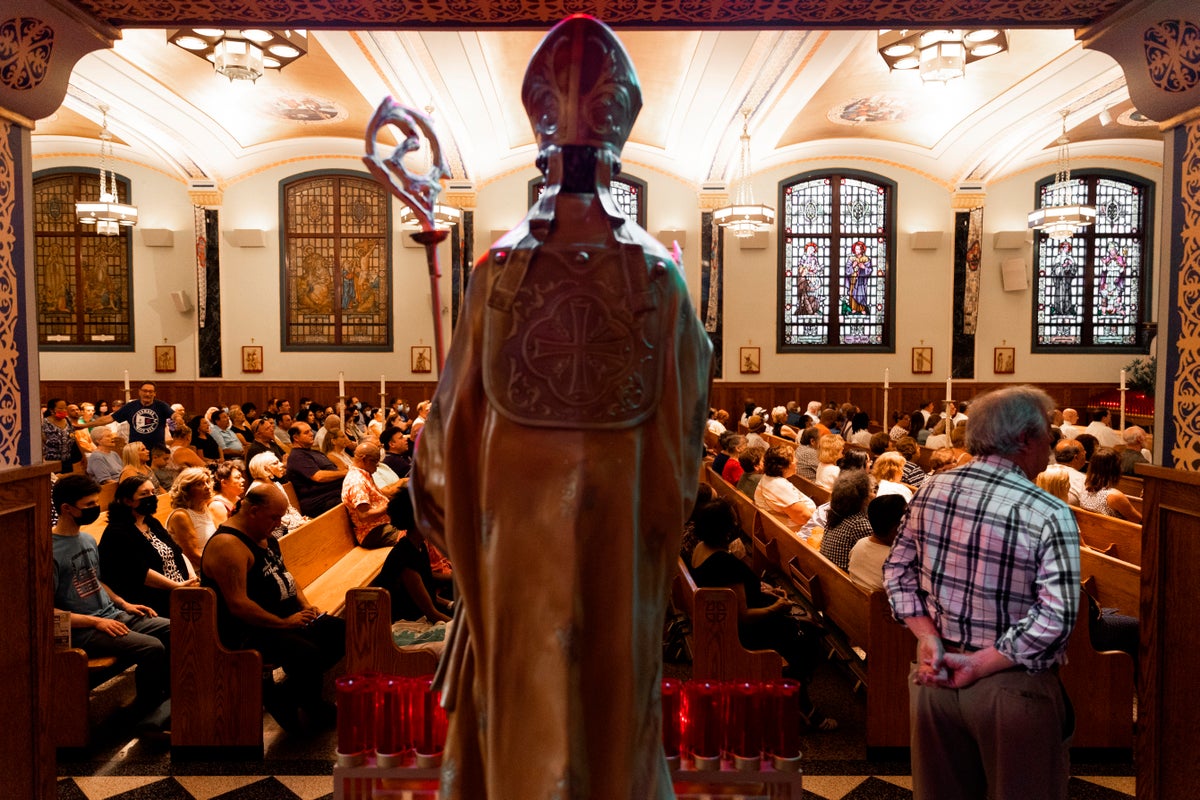
By the thousands, revelers recently returned to Havemeyer Street in New York City’s Williamsburg neighborhood to celebrate the annual Giglio Feast following its first-ever cancellation in 2020, due to the COVID-19 pandemic, and then downsized crowds in 2021.
The feast, first held in Williamsburg in 1903 by immigrants from Nola, Italy, combines two celebrations.
One, typically held on June 22, is dedicated to St. Paulinus, the Bishop of Nola from 409 AD to 431 AD, and the other, celebrated on July 16, to Our Lady of Mount Carmel, the name given to the Virgin Mary by the Catholic Church’s Carmelite Order. While the feast used to span several weeks between the holidays, it has since been combined into one 12-day event.
Throughout the festivities, people from the Catholic church and the surrounding community walk the streets, savoring food from pop-up food stands and playing carnival games.
“I’ve always been mesmerized by the feast,” said Robert Mestrandrea. “As I grew older, the devotion to the Blessed Mother grew, as well as love for the feast.”
Mestrandrea, 20, has been an altar server at the Shrine Church of Our Lady of Mount Carmel for the past eight years.
The highlight of the feast is the lifting of the Giglio, an 80-foot, 4-ton tower crowned with a life-size St. Paulinus figurine. As 100 to 150 men struggle to walk with the Giglio on their shoulders, an older man takes the lead, clearing the way and waving a cane while shouting directions.
In 2019, the church, which has been in charge of the feast since the 1950s, put out a call for volunteer lifters for the first time, citing struggles with passing the tradition onto the next generation.
However, this year no such announcement was necessary, as more than enough volunteers came forward following the pandemic, said Monsignor Jamie Gigantiello, the church’s pastor.
For many who participate, the feast serves not only as a religious celebration, but as a reunion for the community.
“The feast has changed a lot because the neighborhood has gentrified and many of the old-timers have moved away — but they come back for the feast,” said Gigantiello. “So this is kind of like a reunion of the parishioners of this parish and people that lived in this neighborhood”
Anthony Inserelli, 26, born and raised in Williamsburg, has been coming to the feast since he could walk.
Inserelli is one of the lifters, lifting since 2009 or 2010.
“I was born into it and that was it,” he said. “I had no choice.”
Inserelli described lifting the Giglio as painful and heavy but said “if everyone works together, it’s one of those things that everybody enjoys.”
Although an Italian-American tradition, the feast also caters to other ethnic groups, celebrating a Mass in five languages on the feast day of Our Lady of Mount Carmel.
Marie Guerda Pericles came to the United States from Haiti 31 years ago, first settling in Florida.
The state didn’t feel like home and two years later Pericles moved to New York. Since then, she has been a parishioner at the Shrine Church of Our Lady of Mount Carmel.
Pericles remembers celebrating the feast of Our Lady of Mount Carmel in Haiti, a tradition she hopes that parents will pass on to their children in New York. She estimates that more than 1,000 Haitians attend the Giglio feast every year, some, like Pericles’ sister, making the pilgrimage from other countries.
But some, like Tristan Alexander, wandered into the feast for the first time this year.
“We were just walking nearby and we heard the music and all the lights and things and wanted to come check it out,” Alexander said. “I like it, it’s cute.”
While the lifting of the Giglio is the main highlight of the feast, parishioners and visitors flock to the church to walk in processions and light votive candles.
On July 16, men carried the statue of Our Lady of Mount Carmel from its shrine. Hundreds of people trailed a float with the statue for more than three hours, some raising rosaries and others reaching to touch her.
Other times, people knelt at the shrine, praying to Our Lady of Mount Carmel.
Gigantiello, the ringmaster of the event, stressed the importance of the feast as the church’s biggest outreach event of the year, bringing in young people to carry on the Italian tradition.
“The Italians have built this city. They built this country. They came here and they contributed to this country,” he said. “And this is a way of keeping their memory alive.”







